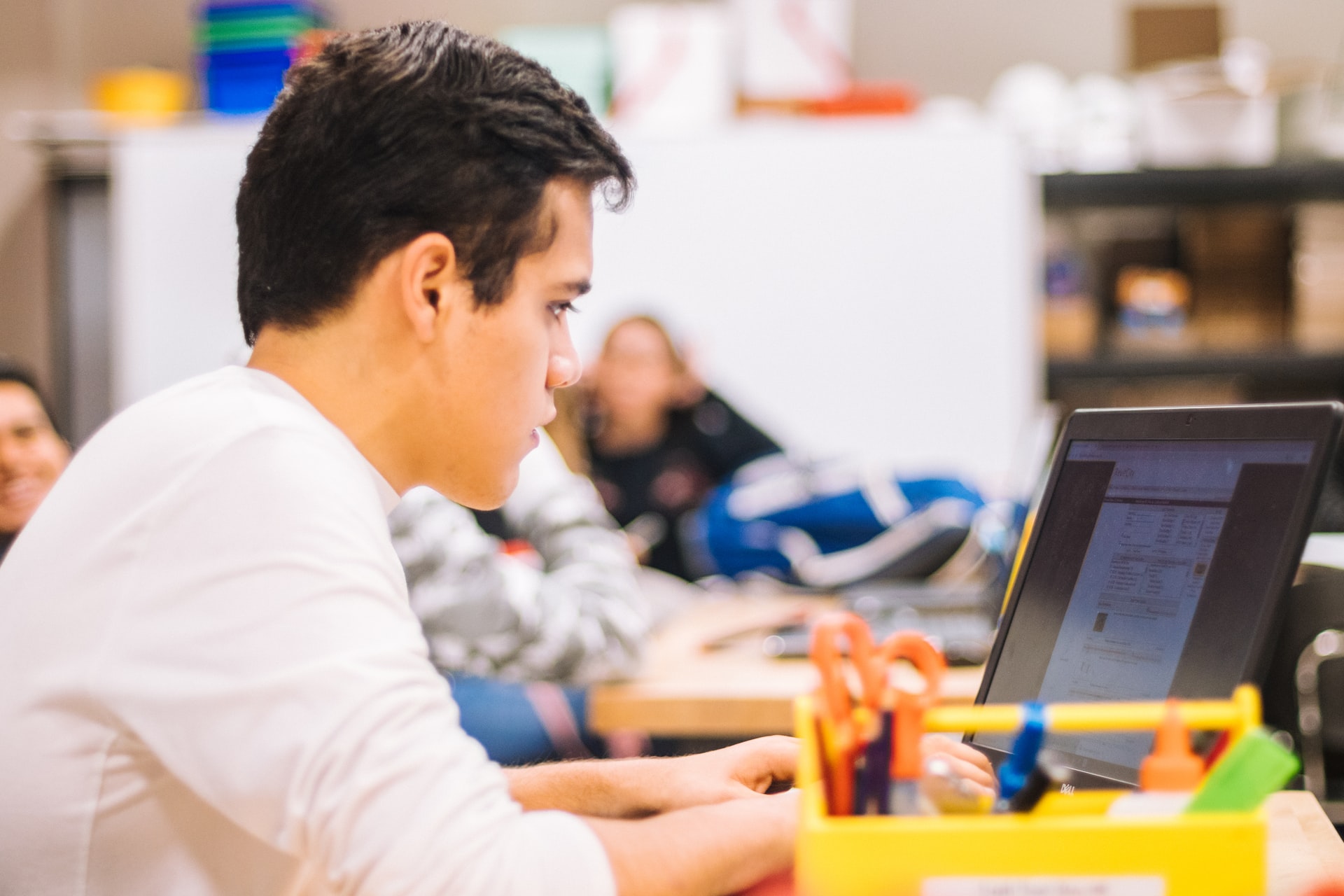Ensuring That All Students Can See Themselves in STEM
 Photo by Marília Castelli on Unsplash
Photo by Marília Castelli on Unsplash
Meeting professionals of color in science, technology, engineering, and math can be a game-changer for high school students.
- 0 Comments
- Aug 20, 2021 10:00:00 AM
- Posted by Maria Alejandra Calcetero
- Topics: Robotics, STEM, Education, Curriculum, Robots,, Learning, Innovation, Makerspace, Educators, teaching, distance learning, Automation, Online Learning, Educational Robots, schools
3 Ways to Build Better Edtech Processes for Teaching and Learning
By Maxwell Witt
 Photo by jose aljovin on Unsplash
Photo by jose aljovin on Unsplash
Burnout in the education system highlights the importance of technology integration to improve edtech processes.
- 0 Comments
- Aug 18, 2021 10:00:00 AM
- Posted by Maria Alejandra Calcetero
- Topics: Robotics, STEM, Education, Curriculum, Robots,, Learning, Innovation, Makerspace, Educators, teaching, distance learning, Automation, Online Learning, Educational Robots, schools
Two Ways Using Educational Robotics In Schools Saves Teachers Time For Creative Work
By Amanda Dudley
 Photo by Fitore Fazliu on Unsplash
Photo by Fitore Fazliu on Unsplash
As a teacher, what would you give to have a few extra hours in your workweek for yourself? A few extra hours during which you can put your feet up and complete that novel you've been working on for months.
This sounds like a dream that may never come true unless you discover a magical lamp with a genie trapped inside it. Nevertheless, thanks to technology, this dream is gradually coming to life.
In today's world, educational robots are a phenomenon that's rapidly infiltrating the educational system. More and more teachers are integrating robotics into STEM classes and even art lessons, making the learning process more seamless and fun.
However, this educational revolution offers other benefits for overworked teachers. Recent studies have shown that robotics in education can help teachers save time, and we'll show you how in a bit.
- 0 Comments
- Aug 17, 2021 10:00:00 AM
- Posted by Maria Alejandra Calcetero
- Topics: Robotics, STEM, Education, Curriculum, Robots,, Learning, Innovation, Makerspace, Educators, teaching, distance learning, Automation, Online Learning, Educational Robots, schools
6 Ways to Encourage Learning Success in Virtual Classrooms
By Devin Partida
 Photo by Chris Montgomery on Unsplash
Photo by Chris Montgomery on Unsplash
Educators strive to make learning fun and interactive, but the pandemic made that more challenging. Instead of bonding with students in person and creating group activities, teachers have to think outside the box to keep young people interested in heavy material. Here are six ways to encourage learning success in virtual classrooms that focus on STEM subjects.
- 0 Comments
- Apr 19, 2021 10:00:00 AM
- Posted by Natalia Galvis
- Topics: Robotics, About the Robots, EdTech, STEM, Curriculum, teachers, students, Technology, Edchat, Digital Technology, teaching, online, virtual learning, lessons, eLearning, Automation
7 predictions about fall back-to-school with COVID
 Photo by Paul Siewert on Unsplash
Photo by Paul Siewert on Unsplash
Although promising signs indicate the COVID pandemic is becoming more manageable, it's reasonable to expect the back-to-school season to look different.
- 0 Comments
- Apr 7, 2021 10:00:00 AM
- Posted by Natalia Galvis
- Topics: Robotics, About the Robots, EdTech, STEM, Curriculum, teachers, students, Technology, VR, Realidad Virtual, Edchat, Digital Technology, teaching, online, Virtual Reality, lessons, eLearning, Automation, Expeditions 2.0
Two Ways to Bring Games Into Your Classroom
By Hubert Ham
 Photo by Fredrick Tendong on Unsplash
Photo by Fredrick Tendong on Unsplash
Gamification and game-based learning are different instructional strategies, but both can work wonders for student engagement.
- 0 Comments
- Apr 6, 2021 10:00:00 AM
- Posted by Natalia Galvis
- Topics: Robotics, About the Robots, EdTech, STEM, Curriculum, teachers, students, Technology, VR, Realidad Virtual, Edchat, Digital Technology, teaching, online, Virtual Reality, lessons, eLearning, Automation, Expeditions 2.0
5 Ways To Transform How STEM Is Taught In Schools
By Fabricio Pamplona
 Photo by Jeswin Thomas on Unsplash
Photo by Jeswin Thomas on Unsplash
STEM is a crucial part of any student’s curriculum, right from the initial phase of their educational journey. In their formative years, the skills and knowledge gained by students are much more concrete and reflect in the way they approach their professional lives. Considering this, facilitating STEM learning requires educators and students to collaborate so that the learning experience can be successful and goal-oriented.
With the amount of information that students consume today, it is a great challenge for educators to create unique learning experiences. However, with the right tools and technologies, educators can truly create memorable STEM learning experiences that can help students learn and grow.
Here are a few ways in which you can transform how you teach STEM subjects to your students:
- 0 Comments
- Apr 5, 2021 10:00:00 AM
- Posted by Natalia Galvis
- Topics: Robotics, About the Robots, EdTech, STEM, Curriculum, teachers, students, Technology, VR, Realidad Virtual, Edchat, Digital Technology, teaching, online, Virtual Reality, lessons, eLearning, Automation, Expeditions 2.0
10 EdTech trending topics in higher education right now
 Photo by Annie Spratt on Unsplash
Photo by Annie Spratt on Unsplash
The changes set in motion in 2020 offered the world of higher education the chance to explore new opportunities and get a deeper understanding of matters previously only partially uncovered. Technology played a major role in this respect: in fact, with the massive shift to remote and hybrid schedules, EdTech helped completely reshape learning and teaching. The following list features 10 EdTech trending topics in higher education to keep an eye on right now and in the future post-pandemic world.
- 0 Comments
- Apr 2, 2021 10:00:00 AM
- Posted by Natalia Galvis
- Topics: Robotics, About the Robots, EdTech, STEM, Curriculum, teachers, students, Technology, VR, Realidad Virtual, Edchat, Digital Technology, teaching, online, Virtual Reality, lessons, eLearning, Automation, Expeditions 2.0
IoT: future applications in K-12 and higher education
 Photo by Timothy Muza on Unsplash
Photo by Timothy Muza on Unsplash
The Internet of Things (IoT) is a network of interrelated physical objects connected through the internet, which has found several applications in the education world in recent years, from K-12 to higher education.
The purpose of this connection? To put it simply, to exchange and transfer data without requiring direct intervention. IoT has become an integral part of the innovation brought to schools by EdTech in recent years, and even though it is not as widespread as of now, it will soon find its way into more and more institutions in the upcoming years.
- 0 Comments
- Apr 1, 2021 10:00:00 AM
- Posted by Natalia Galvis
- Topics: Robotics, About the Robots, EdTech, STEM, Curriculum, teachers, students, Technology, VR, Realidad Virtual, Edchat, Digital Technology, teaching, online, Virtual Reality, lessons, eLearning, Automation, Expeditions 2.0
Poly by Google will be shutting down forever on June 30, 2021
This is a reminder that one month from today, on April 30, 2021, Poly by Google we’ll be shutting down the ability to upload models directly on the Poly website or via API.

- 0 Comments
- Mar 31, 2021 10:00:00 AM
- Posted by Natalia Galvis
- Topics: Robotics, About the Robots, EdTech, STEM, Curriculum, teachers, students, Technology, VR, Realidad Virtual, Edchat, Digital Technology, teaching, online, Virtual Reality, lessons, eLearning, Automation, Expeditions 2.0
Relevant Posts
Popular Posts
Subscribe to Email Updates
-
I Want To Learn MoreADDITIONAL INFORMATION


